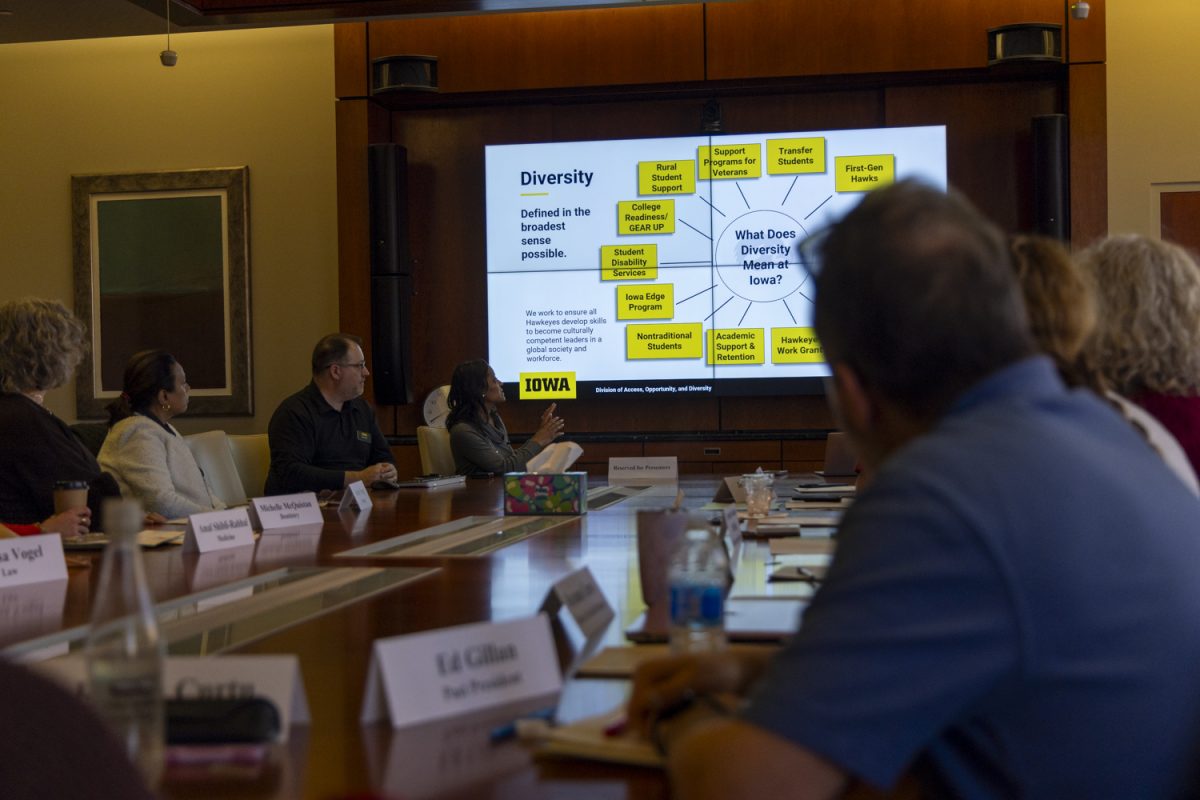The University of Iowa Faculty Council discussed the implications of the division set to replace the former Diversity, Equity, and Inclusion office labeled the Division of Access, Opportunity, and Diversity.
The change resulted from Senate File 2435, a law put in place Iowa code that prohibits higher education institutions from having DEI offices. It also prohibits policies, procedures, or training that promote differential treatment or special benefits based on race, sex, color, or ethnicity.
The legislation takes effect July 1, 2025.
According to Executive Officer and Associate Vice President of AOD Elizabeth Tovar, one of the biggest tasks of the division was launching the division itself.
“A lot of the heavy lifting is already done,” she said. “We’ve already gone in and significantly changed the division formally known as DEI. We are now the division of AOD. Philosophically, we are different, our purpose, the work that we do within that space, is different.”
A new concept Tovar has explored to form the new division is defining diversity in the broadest sense. In the new division, she said, “diversity” extends beyond race and gender to include first-generation students, non-traditional students, and veterans.
“When we don’t have a good organizational culture where we embrace people, backgrounds, multiple viewpoints, multiple perspectives,” Tovar began. “There is a real cost, multiple costs involved, there’s lack of innovation, lack of productivity — that’s why this work is so critical.”
Tovar described that professors can still converse with students over DEI-related topics, as long as they are not actively representing the school through email or other means.
“As long as you’re not using any official university branding to market and promote what point you’re making, that you’re not speaking in an official capacity of the university, those things are perfectly acceptable,” she said.
RELATED: Regents working with universities to end federal DEI measures
As Tovar pointed out, other means of expressing viewpoints through committees become tricky.
“There are things out there called DEI committees that we have across our campus that, quite honestly, we now have to label as illegal,” she said. “If you look like you are a part of the institution, if you’re using our university grading…this is no longer in compliance with the law.”
Many councilors, like Associate Professor of Dance Theory Christopher-Rasheem McMillan, believed the change to be a step backward.
“It’s like a midnight reversal of all the things that people have had to work for a long time with equity on campus,” he said. “A lot of the learning that happens on campus happens outside of the classroom. And so, I think the faculty as a body should be very alarmed with these recent terms.”
Joel Kline, professor of Internal Medicine-Pulmonary, said the removal of DEI sets a dangerous feeling in the classroom.
“With this, we have our reported leadership telling us that in fact, we can’t discuss the negatives of racism, allowing racism positively to go forward,” Kline said. “How do you continue to work in an environment like that, where you really have zero respect for the motives that led to this?”
Editor’s note: A previous version of this article misattributed the reasoning for the creation of the Division of Access, Opportunity, and Diversity. The DI regrets this error.



